Related Research Articles

The music of Bangladesh spans a wide variety of styles. Bangladesh claims some of the most renowned singers, composers and producers in Asia. Music has served the purpose of documenting the lives of the people and was widely patronized by the rulers. It comprises a long tradition of religious and regular song-writing over a period of almost a millennium.

"Amar Sonar Bangla" is the national anthem of Bangladesh. An ode to Mother Bengal, the lyrics were written by Bengali polymath Rabindranath Tagore in 1905, while the melody of the hymn was adopted from the Baul singer Gagan Harkara's song "Ami Kothay Pabo Tare" set to Dadra Tala. The modern instrumental rendition was arranged by Bangladeshi musician Samar Das.
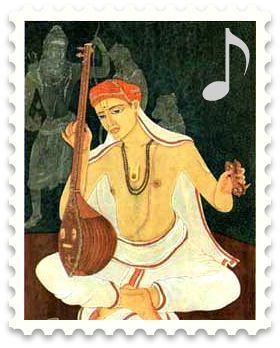
The music of West Bengal includes multiple indigenous musical genres such as Baul, Ramprasadi, Bishnupuri Classical, Kirtan, Shyama Sangeet, Rabindra Sangeet, Nazrul Geeti, Dwijendrageeti, Prabhat Samgiita, Agamani-Vijaya, Patua Sangeet, Gambhira, Bhatiali, Bhawaiya, Bengali Rock.
South Asian literature refers to the literature that is composed by authors in the Indian subcontinent and its diaspora. It has an extensive history with some of the earliest known pieces of literature. South Asia has many different languages that have been spoken due to its size and how long people have been inhabiting it. This has caused the region to be the most linguistically diverse region in the planet, and as well as having four language families, hundreds of languages and thousands of dialects. Many modern pieces of South Asian literature are written in English for a global audience. Many of the ancient texts of the subcontinent have been lost due to the inability to preserve verbally transmitted literature. South Asia has many significant authors that shaped the postcolonial period and response to the British establishment in the subcontinent. Modern South Asian literature has a deep focus on independence from Britain, mainly expressed in prose, this literature commonly discusses the partition of India and how different South Asian nations, religions, and cultures interact with each other. Countries to which South Asian literature's writers are linked include India, Pakistan, Bangladesh, Sri Lanka and Nepal. Works from Bhutan, Myanmar, Tibet, and the Maldives are sometimes also included.

The Bangla Academy is the official regulatory body of the Bengali language in Bangladesh. It is an autonomous institution funded by the Government of Bangladesh that fosters the Bengali language, literature and culture, works to develop and implement national language policy and conducts original research in Bengali. Established in 1955, it is located in the Burdwan House in Shahbagh, Dhaka, within the grounds of the University of Dhaka and Suhrawardy Udyan. The Bangla Academy hosts the annual Ekushey Book Fair.

The Pashchimbanga Bangla Akademi is the official regulatory body of the Bengali language in West Bengal, India. It was founded on 20 May 1986 in Kolkata to act as the official authority of the language and is entrusted with the responsibility of reforming Bengali spelling and grammar, compiling dictionaries, encyclopedias and terminologies and promoting Bengali language and culture in West Bengal. Though the Akademi has no enforcement power over their rules and regulations, they are widely accepted by the Governments of West Bengal and Tripura as well as a considerable number of private publishing houses and institutions such as the Oxford University Press and the Ramakrishna Mission.
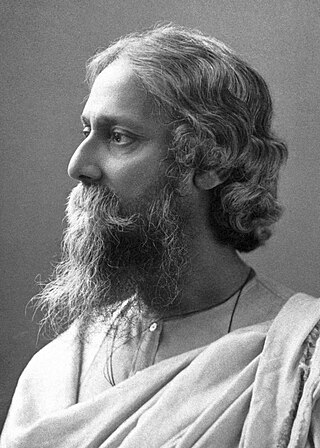
Bengali literature denotes the body of writings in the Bengali language and which covers Old Bengali, Middle- Bengali and Modern Bengali with the changes through the passage of time and dynastic patronization or non-patronization. Bengali has developed over the course of roughly 1,300 years. If the emergence of the Bengali literature supposes to date back to roughly 650 AD, the development of Bengali literature claims to be 1600 years old. The earliest extant work in Bengali literature is the Charyapada, a collection of Buddhist mystic songs in Old Bengali dating back to the 10th and 11th centuries. The timeline of Bengali literature is divided into three periods: ancient (650–1200), medieval (1200–1800) and modern. Medieval Bengali literature consists of various poetic genres, including Hindu religious scriptures, Islamic epics, Vaishnava texts, translations of Arabic, Persian and Sanskrit texts, and secular texts by Muslim poets. Novels were introduced in the mid-19th century. Nobel laureate Rabindranath Tagore is the best known figure of Bengali literature to the world. Kazi Nazrul Islam, notable for his activism and anti-British literature, was described as the Rebel Poet and is now recognised as the National poet of Bangladesh.

Thakurmar Jhuli is a collection of Bengali folk tales and fairy tales. The author Dakshinaranjan Mitra Majumder collected some folktales of Bengali and published some of them under the name of "Thakurmar Jhuli" in 1907. The Nobel-Laureate, Rabindranath Tagore wrote the introduction to the anthology. Since then, it has become iconic in Bengali children's literature, becoming a household name in West Bengal and Bangladesh over the years.

Rabindranath Tagore was a Bengali poet, writer, playwright, composer, philosopher, social reformer, and painter during the age of Bengal Renaissance. He reshaped Bengali literature and music as well as Indian art with Contextual Modernism in the late 19th and early 20th centuries. Author of the "profoundly sensitive, fresh and beautiful" poetry of Gitanjali, he became in 1913 the first non-European and the first lyricist to win the Nobel Prize in Literature. Tagore's poetic songs were viewed as spiritual and mercurial; where his elegant prose and magical poetry were widely popular in the Indian subcontinent. He was a fellow of the Royal Asiatic Society. Referred to as "the Bard of Bengal", Tagore was known by sobriquets: Gurudeb, Kobiguru, and Biswokobi.
The Rabindra Puraskar is the highest honorary literary award given in the Indian state of West Bengal. This award is named after the famous Indian poet Rabindranath Tagore and is administered by the Government of West Bengal under the aegis of the Paschimbanga Bangla Academy, Kolkata.The award is given for creative literature, non-fiction and books about Bengal in Bengali as well as other languages.
Romanisation of Bengali is the representation of written Bengali language in the Latin script. Various romanisation systems for Bengali are used, most of which do not perfectly represent Bengali pronunciation. While different standards for romanisation have been proposed for Bengali, none has been adopted with the same degree of uniformity as Japanese or Sanskrit.

Shaheb Chatterjee is a Bengali Indian male actor and singer of Tollywood Bangla and Bengali television.

Shubh Sukh Chain was the national anthem of the Provisional Government of Free India.
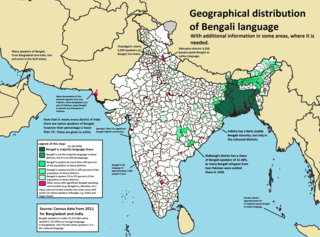
Bengali, also known by its endonym Bangla, is an Indo-Aryan language from the Indo-European language family native to the Bengal region of South Asia. With Over 250 million native speakers and another 41 million as second language speakers as of 2024, Bengali is the sixth most spoken native language and the seventh most spoken language by the total number of speakers in the world. It is the fifth most spoken Indo-European language.
Ghulam Murshid is a Bangladeshi author, scholar and journalist, based in London. He won a number of awards, including Bangla Academy Literary Award in 1982 for his contribution to research.; Prothom Alo Book Award in 2007; IFIC literary prize 2018; the Ekusey Padak for language and literature in 2021 and the Vidyasagar Endowments Lectures 1973 at Calcutta University. Besides being a prolific author, Dr. Murshid is a distinguished lexicographer. He edited a three-volume Bengali dictionary, called 'Bibartonmulak Bangla Abhidhan', published in 2013–2014, by the Bangla Academy. In the two hundred years' of history of Bengali dictionaries, it is the first to be based on historical principles. It provides the evolution of the form and meaning of every word and traces the first use thereof in written Bengali.
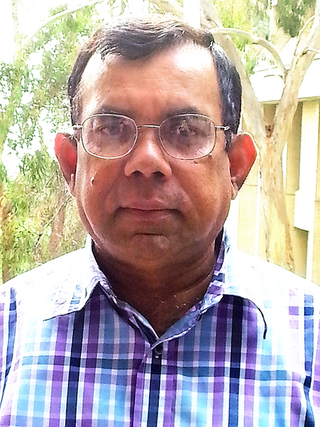
Mohammad A. Quayum is an academic, writer, editor, critic and translator.
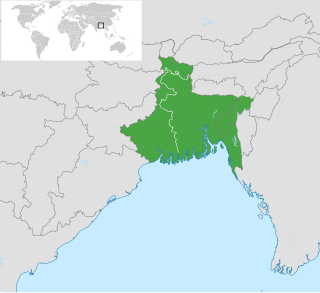
Baṅgamātā, Bangla Maa, Mother Bengal or simply বাংলা/ Bangla, is a personification of Bengal created during the Bengali Renaissance and later adopted by the Bengali nationalists. In Bangladeshi Bengali and Indian Bengali poetry, literature, cultural and patriotic song, she has become a symbol of Bangladesh and India's West Bengal & Tripura and considered as a personification of the People's Republic of Bangladesh. The Mother Bengal represents not only biological motherness but its attributed characteristics as well – protection, never ending love, consolation, care, the beginning and the end of life.

Khirer Putul is a children's fantasy novel written by Abanindranath Tagore in 1896. Khirer Putul is considered a masterpiece and landmark by writers in Bengali language children's literature. Khirer Putul is a simple and touching tale about the sugar doll, the fate of Duorani and a tricky and extraordinary monkey. Aadi Brahmosamaj press first published this book. Later on, it was translated into other languages. The story was adapted into a film of the same name by Indian writer and director Purnendu Pattrea in 1976. Khirer Putul, an Indian television soap opera based on the novel aired on Zee Bangla in 2020.

Ahmed Rafiq is a Bangladeshi language movement activist, writer and researcher on Rabindranath Tagore and his literature. He achieved Ekushey Padak in 1995 by the Government of Bangladesh. Tagore Research Institute in Kolkata conferred the Rabindratattacharya title on him in 2011.

Chokher Bali is a 1903 Bengali novel by Rabindranath Tagore that revolves around the central character Binodini and her relationships with three individuals. It explores the extramarital affair between Binodini, a young widow, and Mahendra, an old suitor of hers, the complicated friendship with Asha, Mahendra's wife, and her mutually conflicting feelings with Behari, Mahendra's childhood best friend. The novel also highlights issues of female literacy, child marriage, patriarchy within the family, and the fate of widows during that era.
References
- ↑ "Bengali culture, language kept alive among the young". The Straits Times . Singapore. 26 February 1997.
- ↑ "Bengali songstress to present Tagore's songs". The Straits Times . Singapore. 7 July 1995.
- ↑ Tay, Hong Yi (13 April 2017). "Tagore, Tagore, burning bright". The Straits Times . Singapore. Retrieved 7 May 2022.